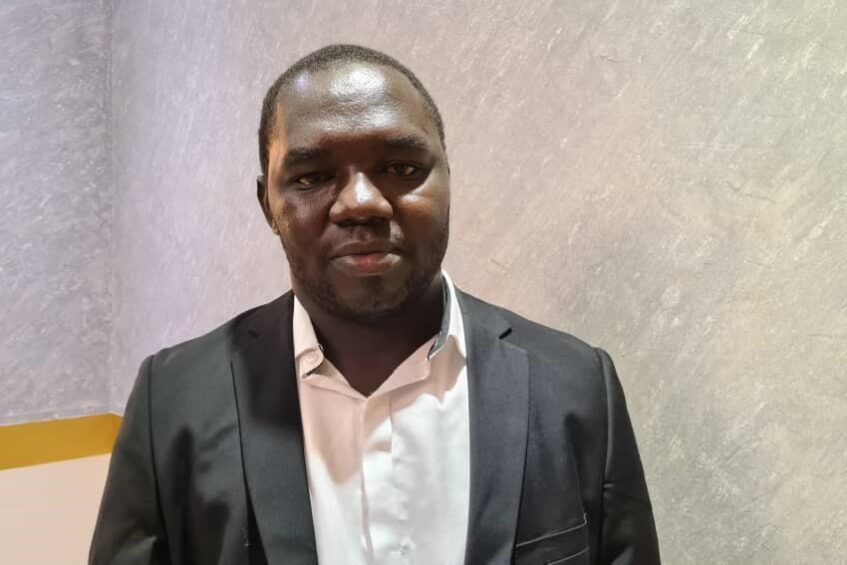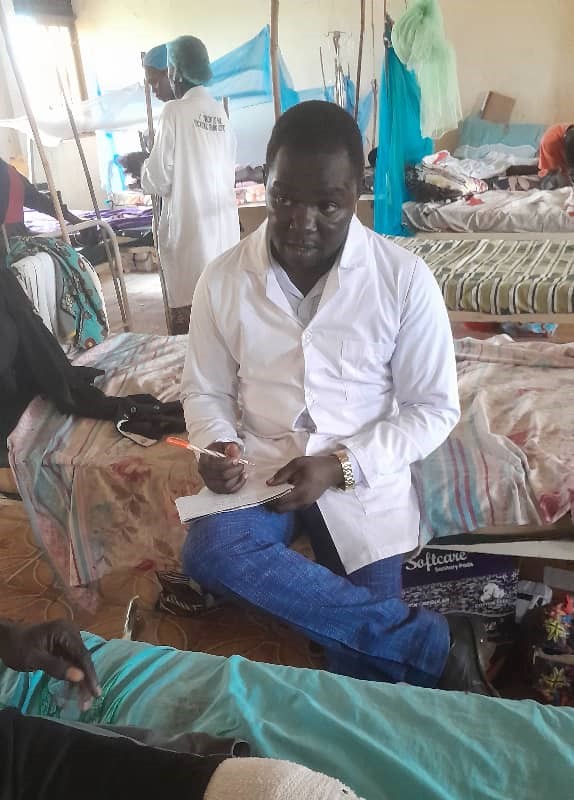You are here: Home | Featured | Health | Humanitarian | News | Displaced to South Sudan in 2011, Farouk now strives to serve fleeing countrymen

Sudanese refugee and medical student Benjamin Farouk. (Photo/Charles Wote)
After escaping a deadly conflict in Sudan’s Nuba Mountain about a decade ago, Benjamin Farouk found refuge in South Sudan and now strives to help thousands of his displaced countrymen access healthcare.
The 32-year-old refugee was admitted to Upper Nile University in 2015 and has just completed his Bachelor’s Degree in Medicine, awaiting graduation.
He is currently attached as an intern in internal medicine and orthopedics unit at both Juba Teaching Hospital and Juba Military Hospital.
“I look at how I can help my fellow refugees in the area of health, first of all attend to their issues when someone falls sick,” Farouk said in an interview with Eye Radio.
“I am able to treat them and then look at how we can basically empower them with knowledge on preventive measures on all the conditions.”

For decades, rebel movements resisting the reign of former Sudanese President Omar Al-Bashir fought the country’s army in the Nuba Mountain and Darfur regions.
The conflict between the SPLA-North and Sudan Armed Force caused at least 2 million deaths and the displacement of another 4 million people.
While South Sudanese voted overwelmingly to break away from Sudan on 9th July 2011, the Nuba mountains and its neighboring regions were left out to face the never-ending crisis.
Farouk, who is now close to becoming a certified medical doctor, said he and fellow colleagues have formed a charity organization that will provide health service to vulnerable Sudanese civilians pouring into South Sudan on daily basis.
“The best part of medicine is being aware of the preventive practices rather than allowing people to fall ill, and then you tend to treat them. So, my dream is to ensure that I raise awareness campaigns among all my fellow refugees.”
“And ensure that they are properly informed on all the health conditions. For those who become unfortunate and they fall sick, I can help to treat them or attend to their needs.”
Benjamin Farouk grew up in the midst of Sudan’s longest civil war which ended with signing the Comprehensive Peace Agreement in Naivasha, Kenya in 2005.
But, seven years after Sudan held its breathe, war broke out in the Nuba Mountain, and Farouk was forced to flee his home and move to South Sudan for refuge.
“I fled to South Sudan following the conflict that broke out between the Nuba Mountain’s region in Sudan and the government in Sudan so, in 2011 when the conflict broke out, that is why we fled from Sudan and then came seeking refuge in South Sudan.”
He said the 2011 Sudanese conflict brought hardship and left the majority in Nuba Mountain cut off from basic services.
Farouk also recalled the aerial bombardments that targeted civilians’ residences, threatening their lives.
“When fighting breaks out, there is general insecurity for people ranging from threats to the lives, to food insecurity, to inability to access basic services.” He said.
“It makes life difficult to survive and stay where there are aerial bombardments being targeted to the civilians’ house, missiles that fly to the civilian inhabited areas, so you end up running to seek for refuge or safety somewhere where your life is less threatened.”
Benjamin Farouk and other fellow Sudanese refugees have initiated a refugee charity referred to as Rediscovering Humanity and Health, with the objective of serving the refugees and host communities.
According to him, the nonprofit refugee organization seeks to address emerging challenges facing Sudanese refugees in South Sudan and provide them with information on how to live a healthier life.
“We want to help them live healthier lives and promoting quality life by also including in our program what we call livelihood initiatives that will help to empower the refugees on how they can engage in some activities that will earn them a living.”
“We want to liberate people from illiteracy so that they can be able to acquire Knowledge and Skills with they can support themselves. Farouk added.
He said, through the charity, they intend to fight illiteracy among the Sudanese refugees, and empower them to discover their talents.
“This is a new organization that we have established and we are looking at a number of opportunities and the possibilities where we can an identify challenges facing our communities and fight literacy among the refugees.”
The Sudanese refugee said many children in the Nuba Mountain have been forced out of school by years of conflict, adding that he once dropped out of high school.
Mr Farouk said young people of his age mainly studied in schools that were established during the during the liberation struggle that led to the independence of South Sudan.
“As soon as I completed primary eight exams in 2008, I was now in my high school then the war interrupted so we were among the first batch of the children who studied in the bush schools.”
“By comparison, very many pupils or students of my age were left behind and at the moment, I cannot be able to numerically or statistically say, how many are still illiterate.”
About 8.6 million people have been internally displaced or forced to flee Sudan since a deadly conflict erupted between Sudanese waring factions in April 2023, according to the UN refugee agency.
South Sudan has received an influx of more than 600,000 people from Sudan – 139,000 of whom are refugees and asylum seekers since the conflict began in Khartoum.
This adds to the 330,000 refugees that South Sudan had already been hosting, as well as the 2 million internally displaced due to conflict, insecurity and the impact of climate change.
The South Sudan government is in the final stage of launching its National Durable Solutions Strategy – a policy framework aims to address the needs of refugees, returnees, and displaced persons.
The solutions initiative for the displacement Situation in Sudan and South Sudan was initiated in 2020 under the auspices of the IGAD Support Platform and endorsed by the South Sudan cabinet in 2023.
“The challenges that I have been witnessing or realizing since 2011 is that we fled in to a country that has its own internal issues, conflicts and it is just newly independent country that face a lot of problems,” Farouk said.
“So, we were affected doubly by the internal conflicts then we came and witnessed a number of other challenges that South Sudanese themselves faced, so it’s like double problem for us.”
This month, the South Sudan government and aid agencies met in Juba to develop a roadmap for effective implementation of activities aimed to cater for the welfare of refugees, returnees and displaced persons in South Sudan.
The three-day consultative meeting was a mechanism that offer a comprehensive regional response to forced displacement and advocates for the wellbeing of refugees, returnees, IDPs and asylum seekers.
Once implemented, the strategy will create enabling conditions for durable solutions including voluntary repatriation, local integration and resettlement of the returnees and displaced persons.
It will also strengthen asylum by addressing the humanitarian, development and peace-related needs in communities affected by forced displacement in South Sudan.
Commenting on the National Durable Solutions Strategy, Mr. Farouk said it presents a number of opportunities for the refugees and returnees in the country.
“We will have opportunity to access basic education, secondary school education and tertiary education where those refugees who are still in the school going age category will be able to pursue their academic dreams and realize their potential.”
“We want the refugees to fill the impact, to realize the impact not things to be said in papers to be written in the papers we want the last refuge to say now I am beginning to experience the plans that are being at the papers, the strategies that are being formulated.”
On his part, John Dabi, the Deputy Commissioner for the Commission on Refugee Affairs in South Sudan said his agency is working to turn the displacement crisis into opportunities.
“The challenges allow us to move from the challenges, turn the challenges into the opportunities being said, it is actually the main reason of durable solution,” Dabi stressed at the end of a 3-day consultative meeting in Juba on 17th April 2024.
Some of the priority actions provided under the government program to create a conducive environment for the displaced, include sustainable security and safety for all, access to basic services, food, water, shelters, healthcare, roads and education.
Others include promote peacebuilding, reconciliation and healing among the communities, livelihood opportunities, activities, skills training psychosocial counseling among others.
“The most important part of areas of peacebuilding are first of all building peaceful coexistence among the IDPs, returnees, refugees and the host communities which is always one of the most challenging issues when it comes to resource sharing that sometimes led to conflict.” Joseph Kido the Director of conflict resolution and social cohesion, Ministry of peace building.
Dr. Victoria Anib, the head of Social Development at the IGAD Secretariat said the government and the regional stakeholders will operationalize the strategy and translate it into actions.
Support Eye Radio, the first independent radio broadcaster of news, information & entertainment in South Sudan.
Make a monthly or a one off contribution.
Copyright 2024. All rights reserved. Eye Radio is a product of Eye Media Limited.